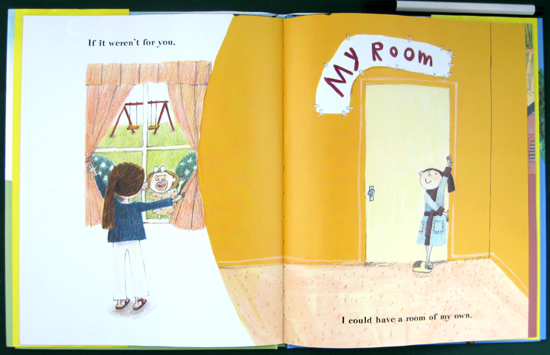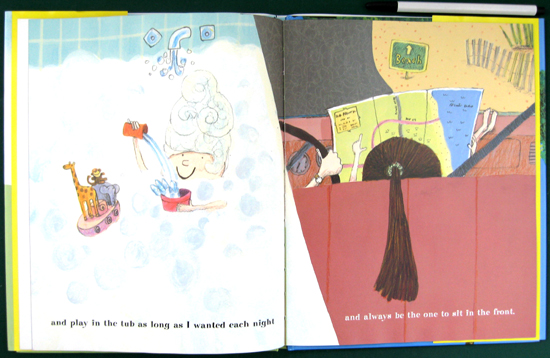|
|
|
|
 |
 이전 | 이전 |  목록 | 다음 목록 | 다음 |
|
|

상세그림1 |

상세그림2 |
|
확대 이미지 : 상세그림1

|
확대 이미지 : 상세그림2

|
[ 책 소개 ]
아동문학의 전설적인 거장인 Charlotte Zolotow가 글을 쓰고, 베스트셀러 그림책의 저자인 G. Brian Karas가 그림을 그린 책입니다.
소녀는 동생이 없었다면 얼마나 좋을까 생각합니다.
집 안의 외동딸이 되면 모든 선물들도 혼자 차지할 수 있고, 케익과 캔디도 혼자서 다 먹을 수 있으며, 학교에서 집으로 돌아 올 때도 동생을 돌보지 않아도 되기 때문에 바로 집으로 향하지 않고 여기저기를 돌아 다녀도 되지요.
텔레비젼도 혼자서 독차지할 수 있고, 밤늦게 전등을 켜고 혼자서 책을 읽을 수도 있으며, 방도 동생과 함께 쓸 필요가 없이 독차지를 할 수 있지요.
아무도 모르게 실컷 울 수도 있고, 매일 밤 욕조에서 물놀이도 실컷할 수 있으며, 강아지도 혼자서 차지할 수 있지요.
창가에 테이블을 놓을 수도 있고, 자동차 앞자리도 차지할 수 있고, 트리하우스도 자기 것이 될 수 있으며, 아무에게도 방해받지 않고 종요히 책을 읽을 수 있지요.
하지만 동생이 예쁜 꽃을 가져다 주자 소녀는 동생을 사랑스럽게 생각합니다. 무엇보다도 친척들이 왔을 때 자기 대신에 동생에게 친척들이 달려 들어서 자기 대신에 동생을 귀찮게 하는 것은 정말 다행이라고 생각합니다...
튼튼한 하드커버입니다.
[ 서지 정보 ]
Edition: Hardcover: 32 pages
ISBN-10: 0060278757
ISBN-13: 978-0060278755
책 크기 : 26cm x 21.2cm
[ 영문 서평 ]
From the Publisher
Sooner or later, all big brothers and big sisters think it. Sometimes they may even say it: If it weren't for you, I'd be the only child and I'd get all the presents. But then there are other times too, times when having a younger sibling may just be a blessing in disguise. . . . With simplicity and grace, the legendary Charlotte Zolotow turns her clear-eyed gaze on the conflict and bond unique to siblings. G. Brian Karas's bright, engaging illustrations bring her classic text to a new generation.
Children's Literature
This timeless lament of the displaced older sister is filled with all the things she could have or could do "if it weren't for you." It is a long list, from having the last piece of cake or candy and the choice of TV show, to a room or tree house all to herself and the whole bottle of soda. Many older siblings will recognize and admit the irritations that sometimes seem so unfair. But there is one good thing: "I'd have to be alone with the grown-ups if it weren't for you." There is a charming, childlike character to the illustrations Karas creates to visualize the simple, middle-class environment and ordinary activities. But even as these appear, there are frequent, unmentioned intrusions of the younger sibling chasing butterflies outside or, near the story's end, bringing a present of a few flowers only to be yelled at. And then there is the reconciliation on the swings and the satisfying end. Food for thought for siblings.
Many children often think about what their life might be like if they did not have a sibling. They imagine not having to share everything, watching whatever they want on television, and always getting the front seat in the car. Some of the advantages are obvious, while others are obviously exaggerated. The character in this story envisions a comfortable life without her younger sister. She sees herself basking in the sun while the family dog serves her hot fudge sundaes. It may be fun pretending you are an only child until you stop to consider some of the disadvantages. Imagine being the only one that gets smothered with hugs and kisses from gross grown-up relatives! This charming story was first published in 1966 but even today it still contains the same fun-filled lesson. With updated illustrations that are warm and colorful, this book is sure to capture young audiences again.
School Library Journal
Big sister is feeling sorry for herself as she imagines how good life would be without her younger sibling. She wouldn't have to share her room, her treats, or her tree house. She could read all day, hog the bathroom, and watch any TV program she wanted. As she sulks, little sister gradually works her way into her sibling's heart with small acts of kindness. Finally big sister concedes that having a younger sister is not all bad. Wisely the author and illustrator resist the temptation to make the ending overly sentimental. Instead of hugs and kisses, the older girl offers her younger sibling a half smile. This is a re-release of a text originally published in 1966 by Harper & Row. Ben Shecter's original illustrations featured two brothers. The new illustrations not only change the gender of the main characters, but also give the story a fresh, contemporary look. Karas's art is bright and cartoonlike, with contrasting colors that give the simple figures energy. LeUyen Pham's Big Sister, Little Sister (Hyperion, 2005) tells the story from the little sister's perspective. Both are worthy offerings on the topic of sibling relations.
Kirkus Reviews
A fatherless boy tells his mom of the father he imagines. This dream father would help him with his homework, play checkers, read to him, tell him jokes and understand about being a boy. He would also do his share of housework and show consideration for his wife. Mom listens carefully, but can make no promises or give assurances that he will ever have that perfect dad. But she does tell him that he could be that wonderful father when he grows up. While ostensibly about father-and-son relationships, it is mother love that surrounds this child. Zolotow handles a delicate situation with compassion. There's no pie-in-the-sky happy ending, but there is abounding love and hope. Originally published in 1971, it certainly holds up a generation later. Pham's new illustrations flow across each two-page spread and beautifully capture the spirit of the text. In addition, endpapers depict crayon drawings of scenes of the boy and his father as if the boy drew them himself. Warm and tender.
|
| * 최근 이 작품을 구입하신 분들의 다른 선택 |
Find Spot at Preschool
A Lift-the-Flap 보드북, 슈퍼바이 |
The Berenstain Bears Christmas Treasury
스토리북 그림책 4권 합본책, 하드커버, 슈퍼바이 |
The Golden Rule
하드커버, 슈퍼바이 |
The Mystery of the Stolen Painting
Greetings from Somewhere시리즈, #3, 슈퍼바이 |
|
| |
|
|< << [1] [2] [3] [4] [5] [6] [7] [8] [9] [10] >> >|
|
|
|